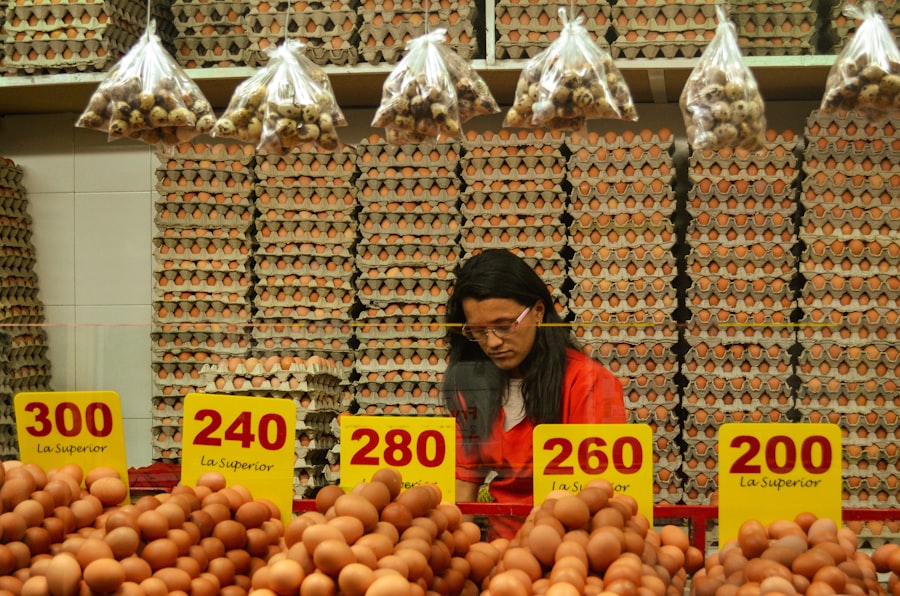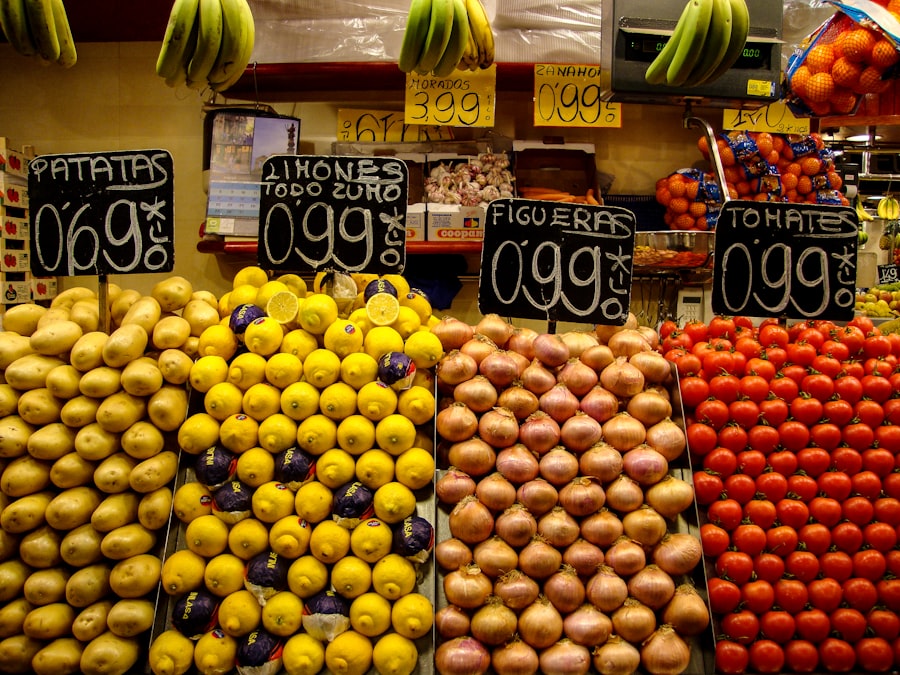Wall Street, often synonymous with the financial heart of the United States, exerts a profound influence on various sectors of the economy, including the food industry. The intricate relationship between financial markets and food prices has become increasingly evident in recent years, as investors and speculators have turned their attention to agricultural commodities. This intersection of finance and food has raised questions about the implications for consumers, farmers, and global food security.
As food prices fluctuate in response to market dynamics, understanding the role of Wall Street becomes essential for grasping the broader economic landscape.
As financial institutions and hedge funds engage in trading agricultural commodities, their actions can lead to significant price volatility.
This volatility can have dire consequences for those who rely on stable food prices for their livelihoods. Consequently, the influence of Wall Street on food prices is a critical issue that warrants careful examination.
Key Takeaways
- Wall Street’s influence on food prices is significant and has far-reaching implications for global food markets.
- Speculation plays a key role in driving up food commodity prices, leading to increased volatility and instability in the market.
- Financial instruments such as index funds and derivatives have a substantial impact on food prices, often leading to price hikes and food insecurity.
- The connection between Wall Street and global food markets has led to increased food accessibility and affordability challenges for many communities.
- Wall Street’s investment strategies have a direct effect on food prices, often leading to price manipulation and market distortions.
The Role of Speculation in Food Commodities
Speculation plays a pivotal role in the trading of food commodities, with investors seeking to profit from price fluctuations. This practice involves buying and selling contracts for future delivery of agricultural products, such as wheat, corn, and soybeans. While speculation can provide liquidity to the markets, it can also lead to price distortions that do not necessarily reflect the underlying supply and demand dynamics.
For instance, when large financial institutions engage in speculative trading, they can create artificial price spikes that impact farmers and consumers alike. The consequences of speculation extend beyond mere price volatility; they can also affect the availability of food. When speculators drive up prices, it can lead to increased costs for producers who may be forced to pass these expenses onto consumers.
This cycle can exacerbate food insecurity, particularly in vulnerable populations who may struggle to afford basic necessities. As such, understanding the role of speculation in food commodities is crucial for comprehending how Wall Street influences food prices.
Impact of Financial Instruments on Food Prices

Financial instruments such as futures contracts, options, and exchange-traded funds (ETFs) have transformed the way agricultural commodities are traded. These tools allow investors to hedge against price fluctuations or speculate on future price movements. However, their widespread use has also contributed to increased volatility in food prices.
For example, when investors flock to agricultural ETFs during times of uncertainty, it can lead to rapid price increases that do not align with actual supply and demand conditions. Moreover, the proliferation of complex financial products has made it easier for institutional investors to enter the agricultural market. This influx of capital can create a disconnect between the financial markets and the realities faced by farmers and consumers.
As prices become more influenced by speculative trading rather than fundamental agricultural conditions, the risk of price bubbles increases. Consequently, the impact of financial instruments on food prices is a critical area of concern for policymakers and stakeholders in the food system.
The Connection Between Wall Street and Global Food Markets
| Metrics | Data |
|---|---|
| Commodity Prices | Fluctuate based on market demand and supply |
| Investment in Food Futures | Affects food prices and availability |
| Speculation | Can lead to price volatility and food insecurity |
| Financialization of Food | Impacts small-scale farmers and food access |
The connection between Wall Street and global food markets is multifaceted and far-reaching. As financial markets become increasingly interconnected, events in one part of the world can have ripple effects on food prices elsewhere. For instance, geopolitical tensions or economic crises can prompt investors to seek refuge in agricultural commodities, driving up prices globally.
This interconnectedness underscores the importance of understanding how Wall Street’s actions can influence food markets on a global scale. Additionally, Wall Street’s influence extends beyond mere price movements; it also shapes agricultural practices and policies worldwide. As investors prioritize certain crops or farming methods based on potential profitability, this can lead to shifts in agricultural production that may not align with local needs or environmental sustainability.
The prioritization of cash crops over staple foods can exacerbate food insecurity in regions that rely heavily on imports. Thus, the connection between Wall Street and global food markets raises critical questions about equity and sustainability in the food system.
How Wall Street’s Actions Affect Food Accessibility and Affordability
The actions of Wall Street have significant implications for food accessibility and affordability. When financial speculation drives up commodity prices, it can create barriers for low-income households who may already be struggling to make ends meet. Rising food prices can lead to difficult choices for families, forcing them to allocate a larger portion of their budgets toward basic necessities like groceries.
This situation is particularly concerning in urban areas where access to affordable fresh produce may already be limited. Moreover, the impact of Wall Street’s actions is not uniform across different demographics. Vulnerable populations, including low-income families and marginalized communities, often bear the brunt of rising food costs.
As prices increase due to speculative trading or market manipulation, these groups may find themselves facing heightened food insecurity. The challenge lies in addressing these disparities while ensuring that farmers receive fair compensation for their products. Ultimately, Wall Street’s influence on food accessibility and affordability highlights the need for a more equitable approach to food distribution.
The Relationship Between Wall Street and Agricultural Futures Markets

The relationship between Wall Street and agricultural futures markets is characterized by a complex interplay of investment strategies and market dynamics. Agricultural futures markets serve as a platform for producers and consumers to hedge against price fluctuations while providing opportunities for investors to speculate on future price movements. However, as institutional investors increasingly participate in these markets, their influence can overshadow the interests of traditional market participants.
This shift has led to concerns about market manipulation and the potential for excessive speculation to distort prices. When large financial entities dominate trading volumes in agricultural futures markets, it can create an environment where prices are driven more by investor sentiment than by actual supply and demand conditions. This phenomenon raises questions about the integrity of these markets and their ability to serve as reliable indicators of agricultural health.
Understanding this relationship is essential for developing policies that promote transparency and fairness in agricultural trading.
The Influence of Wall Street on Food Supply Chain and Distribution
Wall Street’s influence extends beyond commodity trading; it also impacts the entire food supply chain and distribution networks. As financial institutions invest in agribusinesses and food processing companies, their priorities often shift toward maximizing profits rather than ensuring equitable access to food. This focus on profitability can lead to consolidation within the industry, resulting in fewer players controlling larger market shares.
The consolidation of power within the food supply chain can have detrimental effects on small farmers and local producers who struggle to compete with larger corporations backed by Wall Street investments. Additionally, this concentration of power can limit consumer choices and drive up prices as competition diminishes. As such, understanding how Wall Street influences the food supply chain is crucial for addressing issues related to equity, sustainability, and consumer access.
The Effect of Wall Street’s Investment Strategies on Food Prices
Wall Street’s investment strategies have a direct impact on food prices through various channels. For instance, when hedge funds or institutional investors take large positions in agricultural commodities, their buying or selling activities can lead to significant price fluctuations. These strategies often prioritize short-term gains over long-term stability, resulting in increased volatility that can disrupt markets.
Furthermore, investment strategies that favor certain crops or farming practices can shape agricultural production patterns globally. When investors prioritize high-yield cash crops over staple foods, it can lead to imbalances in local food systems that exacerbate hunger and malnutrition. The effect of Wall Street’s investment strategies on food prices underscores the need for a more holistic approach that considers both economic viability and social responsibility.
The Ethical and Social Implications of Wall Street’s Influence on Food Prices
The ethical and social implications of Wall Street’s influence on food prices are profound and multifaceted. As financial markets increasingly dictate agricultural practices and pricing structures, questions arise about who benefits from these dynamics. While investors may reap substantial profits from speculative trading, farmers often find themselves squeezed by rising input costs and volatile market conditions.
Moreover, the prioritization of profit over people raises ethical concerns about equity in the food system. Vulnerable populations may suffer disproportionately from rising food prices driven by speculative trading or market manipulation. Addressing these ethical dilemmas requires a concerted effort from policymakers, industry stakeholders, and consumers alike to advocate for fairer practices that prioritize access to nutritious food for all.
Government Regulations and Policies to Address Wall Street’s Impact on Food Prices
In response to concerns about Wall Street’s influence on food prices, governments around the world have begun exploring regulatory measures aimed at promoting transparency and fairness in agricultural markets. These policies may include stricter oversight of speculative trading practices or measures designed to limit excessive concentration within the agricultural sector. Additionally, governments may consider implementing programs that support small farmers and local producers who are often marginalized by larger corporations backed by Wall Street investments.
By fostering a more equitable marketplace, policymakers can help ensure that all stakeholders benefit from a stable and sustainable food system. Ultimately, effective regulation is essential for mitigating the negative impacts of Wall Street’s influence on food prices.
Strategies for Consumers to Navigate and Mitigate Wall Street’s Influence on Food Prices
As consumers grapple with rising food prices influenced by Wall Street’s actions, there are several strategies they can employ to navigate this complex landscape effectively.
By purchasing directly from local producers, consumers can help strengthen regional economies while potentially reducing their exposure to volatile market forces.
Additionally, consumers can advocate for policies that promote transparency within the food system and hold corporations accountable for their practices. Engaging with local representatives or participating in grassroots movements focused on food justice can amplify voices calling for change. By taking proactive steps to support equitable practices within the food system, consumers can play an essential role in mitigating Wall Street’s influence on food prices while promoting access to affordable nutrition for all.
In conclusion, Wall Street’s influence on food prices is a multifaceted issue that encompasses speculation, investment strategies, ethical considerations, and regulatory challenges. As financial markets continue to shape agricultural practices globally, understanding this relationship becomes increasingly vital for ensuring equitable access to nutritious food for all individuals. By fostering awareness among consumers and advocating for fairer practices within the industry, stakeholders can work together toward a more sustainable future where everyone has access to affordable nourishment.
Wall Street’s influence on food prices is a complex and multifaceted issue, often driven by speculative trading and investment strategies that can lead to significant price volatility. This phenomenon is explored in depth in a related article on how financial markets impact commodity prices, which can be found on the How Wealth Grows website. For a comprehensive understanding of the mechanisms through which Wall Street exerts control over food prices, you can read more in this article. The piece delves into the intricacies of market speculation, the role of futures contracts, and the broader economic implications of financialization in the agricultural sector.
WATCH THIS! 🫣Why Wall Street Is Buying Up America’s Farmland (And Why It Should Terrify You)
FAQs
What is Wall Street’s role in controlling food prices?
Wall Street plays a significant role in controlling food prices through commodity trading, speculation, and investment in agricultural markets.
How does commodity trading affect food prices?
Commodity trading on Wall Street involves buying and selling contracts for future delivery of agricultural products, which can impact current food prices due to speculation and market manipulation.
What is the impact of speculation on food prices?
Speculation in agricultural markets by Wall Street investors can lead to price volatility and inflated food prices, as traders bet on future price movements without any intention of taking physical delivery of the commodities.
How does investment in agricultural markets by Wall Street affect food prices?
Investment in agricultural markets by Wall Street can lead to increased demand for food commodities, driving up prices and potentially causing food shortages in certain regions.
What are the consequences of Wall Street’s control over food prices?
The consequences of Wall Street’s influence on food prices include increased food insecurity, higher costs for consumers, and potential negative impacts on global food supply and distribution.
